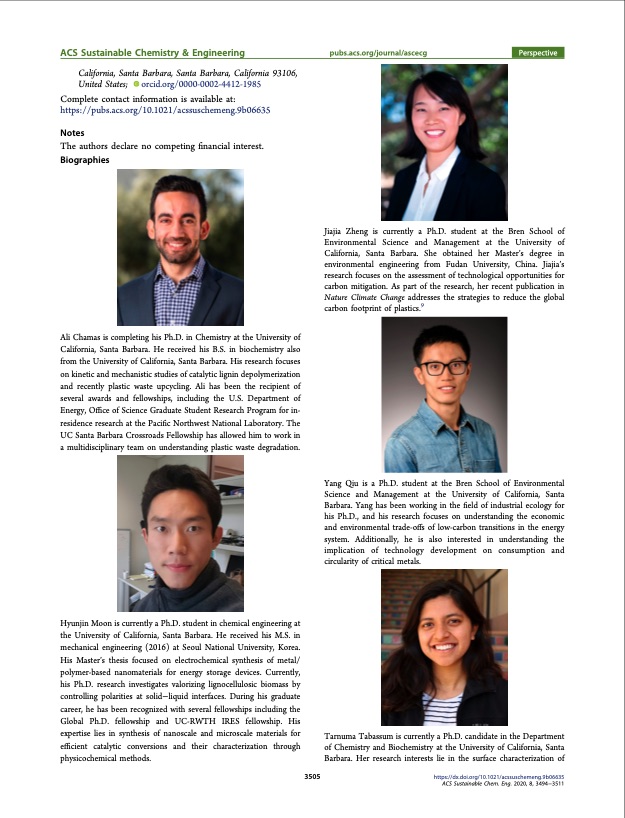
PDF Publication Title:
Text from PDF Page: 012
ACS Sustainable Chemistry & Engineering pubs.acs.org/journal/ascecg Perspective California, Santa Barbara, Santa Barbara, California 93106, United States; orcid.org/0000-0002-4412-1985 Complete contact information is available at: https://pubs.acs.org/10.1021/acssuschemeng.9b06635 Notes The authors declare no competing financial interest. Biographies Ali Chamas is completing his Ph.D. in Chemistry at the University of California, Santa Barbara. He received his B.S. in biochemistry also from the University of California, Santa Barbara. His research focuses on kinetic and mechanistic studies of catalytic lignin depolymerization and recently plastic waste upcycling. Ali has been the recipient of several awards and fellowships, including the U.S. Department of Energy, Office of Science Graduate Student Research Program for in- residence research at the Pacific Northwest National Laboratory. The UC Santa Barbara Crossroads Fellowship has allowed him to work in a multidisciplinary team on understanding plastic waste degradation. Jiajia Zheng is currently a Ph.D. student at the Bren School of Environmental Science and Management at the University of California, Santa Barbara. She obtained her Master’s degree in environmental engineering from Fudan University, China. Jiajia’s research focuses on the assessment of technological opportunities for carbon mitigation. As part of the research, her recent publication in Nature Climate Change addresses the strategies to reduce the global carbon footprint of plastics.9 Yang Qiu is a Ph.D. student at the Bren School of Environmental Science and Management at the University of California, Santa Barbara. Yang has been working in the field of industrial ecology for his Ph.D., and his research focuses on understanding the economic and environmental trade-offs of low-carbon transitions in the energy system. Additionally, he is also interested in understanding the implication of technology development on consumption and circularity of critical metals. Tarnuma Tabassum is currently a Ph.D. candidate in the Department of Chemistry and Biochemistry at the University of California, Santa Barbara. Her research interests lie in the surface characterization of https://dx.doi.org/10.1021/acssuschemeng.9b06635 Hyunjin Moon is currently a Ph.D. student in chemical engineering at the University of California, Santa Barbara. He received his M.S. in mechanical engineering (2016) at Seoul National University, Korea. His Master’s thesis focused on electrochemical synthesis of metal/ polymer-based nanomaterials for energy storage devices. Currently, his Ph.D. research investigates valorizing lignocellulosic biomass by controlling polarities at solid−liquid interfaces. During his graduate career, he has been recognized with several fellowships including the Global Ph.D. fellowship and UC-RWTH IRES fellowship. His expertise lies in synthesis of nanoscale and microscale materials for efficient catalytic conversions and their characterization through physicochemical methods. 3505 ACS Sustainable Chem. Eng. 2020, 8, 3494−3511PDF Image | Degradation Rates of Plastics in the Environment

PDF Search Title:
Degradation Rates of Plastics in the EnvironmentOriginal File Name Searched:
acssuschemeng-9b06635.pdfDIY PDF Search: Google It | Yahoo | Bing
Development of a solar powered Electric Ship The Electricship website originally started off as a project to develop a comprehensive renewable, affordable, modular electric ship... More Info
Modular Boat Hull Composite The case for a unsinkable, modular composite hybrid boat hull... More Info
MS Burgenstock Hybrid Electric Catamaran Lake Lucerne Unique shuttle servicing Lucerne to the Burgenstock Resort... More Info
Ground Power Unit GPU Powered by Lithium Ion Batteries The goal of the Ground Power Unit is to provide a readily accessible, modular, ready-to-power solution for remote power... More Info
| CONTACT TEL: 608-238-6001 Email: greg@electricship.com | RSS | AMP |